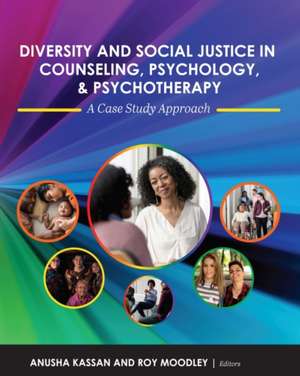Diversity and Social Justice in Counseling, Psychology, and Psychotherapy: A Case Study Approach
Editat de Anusha Kassan, Roy Moodleyen Paperback – 2 aug 2021
The text is designed to advance readers' understanding that ethnic group and race categories are useful but limited without the inclusion of the intersectionality of the Group of Seven (Big 7) identities (and beyond): race/culture/ethnicity, gender, sexual orientations, class, disability, religion/spirituality, and age. Key concepts, such as multiple and intersecting cultural identities and social locations, power, privilege, stereotyping, discrimination, prejudice, and oppression, are explored through various points of entry. Individual chapters cover the integration of antiracism and critical race theory in practice, Indigeneity and coloniality as analytic tools, feminist therapy, ethical considerations, and more.
The book supports the construction of an intersubjective, intrapsychic, and relational space in practice. Each chapter includes a case vignette that illustrates how cultural, historical, economical, and sociopolitical contexts offer a background to diversity and social justice theory and practice, as well as reflective questions to help readers think critically.
Diversity and Social Justice in Counseling, Psychology, and Psychotherapy is an essential resource for students and practitioners within various helping professions.
Preț: 594.90 lei
Preț vechi: 734.44 lei
-19% Nou
Puncte Express: 892
Preț estimativ în valută:
113.86€ • 118.67$ • 94.79£
113.86€ • 118.67$ • 94.79£
Carte tipărită la comandă
Livrare economică 04-18 ianuarie 25
Preluare comenzi: 021 569.72.76
Specificații
ISBN-13: 9781516548590
ISBN-10: 1516548590
Pagini: 434
Dimensiuni: 203 x 254 x 22 mm
Greutate: 0.85 kg
Editura: Cognella Academic Publishing
ISBN-10: 1516548590
Pagini: 434
Dimensiuni: 203 x 254 x 22 mm
Greutate: 0.85 kg
Editura: Cognella Academic Publishing
Descriere
Explores the ways in which helping professions are practiced in the context of a multifaceted society. The text advances understanding that ethnic group and race categories are useful but limited without the inclusion of the intersectionality of race/culture/ethnicity, gender, sexual orientations, class, disability, religion/spirituality, and age.
